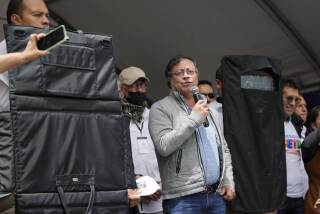Marcos OKs Bill to Allow Election
- Share via
MANILA — President Ferdinand E. Marcos and his ruling party approved a legislative formula Friday for a snap presidential election, calling for Marcos to resign formally but still remain in office.
Marcos would submit a letter of resignation, but it would not be effective until after the Jan. 17 election, permitting him to campaign as president from Malacanang Palace.
The caucus of the ruling New Society Movement (KBL), meeting at Malacanang, also authorized Marcos to choose his running mate. The bill will be presented to the Philippine National Assembly on Monday.
Former Sen. Rene Espina, general secretary of the opposition United Nationalist Democratic Organization (UNIDO), called the formula “patently illegal, a gross violation of the constitution.” He said UNIDO might consider a court challenge.
But he and other opposition spokesmen also indicated they would negotiate with the president’s party. Homobono Adaza, an opposition member of the assembly, told reporters, “We may have to deal with Marcos on his terms.”
Seek to Delay Vote
Barring a court challenge, the snap election seems likely to be held. In any negotiations, however, the opposition is expected to try to delay the vote until February or March, or to combine the election with scheduled local balloting in May.
“When the (election) bill is transmitted to the Batasang Pambansa (National Assembly), it will be accompanied by a resignation of President Marcos as president of the republic,” a Malacanang statement said.
“The president’s resignation will take effect upon the qualification and assumption to office of whoever will be elected president and vice president.”
The constitution provides for a special election upon the resignation of a president, but requires that the Speaker of the assembly take over as interim head of government and that there be at least 45 days between the resignation and the election.
Constitutional experts here have argued that Marcos would have to give up the presidency and its extraordinary powers in order to run in a special election.
But Marcos told the party caucus that “there is no provision in the constitution that is exactly applicable to this situation.”
“If we must be technical,” he asked, “does the constitution say immediate resignation? It does not.”
Resignation ‘Voluntary’
He said his resignation would be voluntary, arguing that the constitution contemplated a “compulsory resignation,” which he likened to “President Nixon when he was driven out of government.”
By comparison, he said, his resignation would come from a “deep feeling” that the time had come to seek a fresh mandate in view of opposition charges against him and his administration.
Under a voluntary resignation, he said, the assembly could set a special election under its legislative powers. The constitution would not have to be amended.
He compared the delayed effectiveness of his resignation to a contract. “Resignation within a period is just like a contract within a period, which does not take effect until, say, one year or six months,” he said.
Marcos said he considered it a “bounden duty” to seek a fresh mandate “in the face of fundamental issues raised by the opposition.”
After the closed caucus, Marcos told reporters: “What was agreed upon here is resignation effective after the proclamation of a winner of the election. So I continue as president but with a compulsory vacancy created after the election because of the resignation.”
Constitutional lawyers may challenge the formula, but the apparent intent of the KBL is to authorize the election and let Marcos, 68, campaign as president for a new six-year term. If he loses, the resignation would be moot.
Questions Constitutionality
Arturo Tolentino, former foreign minister and a top constitutional lawyer, argued at the caucus against the special election, specifically raising questions about the constitutionality of the formula Marcos suggested.
But he said he has no quarrel with Marcos’ intention to seek a new mandate, only the means of using a special election. He said he favors holding presidential elections as scheduled, in spring of 1987.
Tolentino told Marcos, “There is a lot of rumor that you are acting under pressure.”
“There has been no pressure,” Marcos responded, “including (from) the Americans.”
Under the bill to be put before Parliament, candidates for president and vice president would have to file by Dec. 2. There would be a 45-day campaign, right through the Christmas season, a first in the predominantly Roman Catholic Philippines where holiday observances begin in early December and stretch into the second week of January.
Marcos again rejected opposition calls to combine the presidential snap vote with local elections scheduled next May, citing the potential for confusion among voters when faced with campaigns on local issues and his bid for a mandate.
More to Read
Sign up for Essential California
The most important California stories and recommendations in your inbox every morning.
You may occasionally receive promotional content from the Los Angeles Times.













